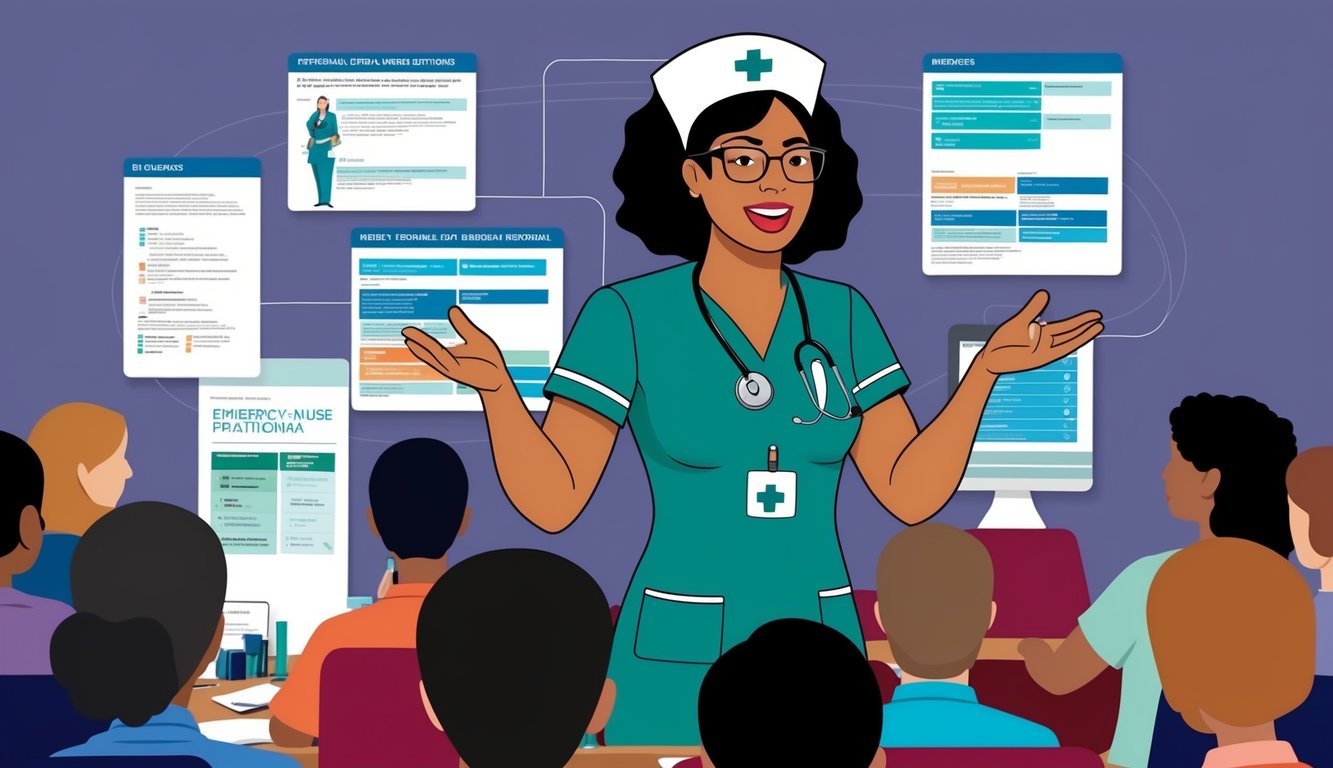Emergency Nurse Practitioners (ENPs) play a vital role in our healthcare system.
They provide essential care in emergency settings, often being the first point of contact for patients facing urgent medical issues. As an ENP, you will have the opportunity to address critical health needs, ensuring timely and effective treatment for patients in high-stress situations.
To become an Emergency Nurse Practitioner, you will need specialized education and certification that equip you with advanced skills.
This training not only enhances your clinical abilities but also opens up numerous career opportunities in various medical environments, including hospitals and urgent care centers.
The demand for ENPs continues to rise, making this a promising career choice for those interested in emergency medicine.
Your skills can significantly impact patient outcomes, and understanding this role can lead you toward a fulfilling career in healthcare.
Key Takeaways
- Emergency Nurse Practitioners provide critical care in urgent medical situations.
- Specialized education and certification are essential for becoming an ENP.
- There are ample career opportunities due to the growing demand for ENPs.
The Role and Scope of Emergency Nurse Practitioners
Emergency Nurse Practitioners (ENPs) play a vital role in providing comprehensive care in emergency settings.
They are equipped with specialized skills that allow them to diagnose and treat a wide range of conditions.
Additionally, their training emphasizes efficient decision-making and emergency procedures, ensuring quality patient care.
Core Competencies of ENPs
ENPs possess key competencies that enable them to function effectively in high-pressure environments.
These competencies include:
-
Clinical Assessment: ENPs must perform thorough evaluations to identify patient needs quickly.
-
Differential Diagnosis: They are trained to recognize various medical conditions based on patient symptoms and history.
-
Patient Management: ENPs manage acute and chronic illnesses, ensuring appropriate care and follow-up.
To learn more about the specific skills needed for ENPs, you can check the Emergency Nurse Practitioner Competencies.
Differential Diagnosis and Decision Making
Effective decision-making is essential in emergency care.
ENPs must be able to quickly develop a differential diagnosis by considering various potential conditions.
This involves:
-
Gathering Patient History: Collecting relevant information about the patient’s past health.
-
Conducting Physical Examinations: Performing exams to gather evidence needed for diagnosis.
-
Utilizing Diagnostic Tests: Interpreting lab tests and imaging results to confirm suspicions.
ENPs rely on critical thinking skills to prioritize care and make timely decisions that can greatly impact patient outcomes.
Emergency Procedures and Resuscitation Techniques
ENPs are trained in numerous emergency procedures and resuscitation techniques.
Their expertise includes:
-
Advanced Cardiovascular Life Support (ACLS): Important for handling cardiac emergencies.
-
Trauma Care: Quick assessment and management of trauma patients.
-
Basic Life Support (BLS): Essential skills for maintaining adequate patient oxygenation and circulation.
These procedures ensure that ENPs can effectively respond to life-threatening situations.
For further information on emergency practice standards, visit the Practice Standards for the Emergency Nurse Practitioner Specialty.
Education and Certification Pathways

To become an Emergency Nurse Practitioner (ENP), you need to follow specific educational requirements and certification processes.
This pathway focuses on advanced nursing degrees and ongoing education to ensure that you have the skills needed for emergency care.
Academic Requirements: BSN to DNP
To start your journey, you must earn a Bachelor of Science in Nursing (BSN).
This degree typically takes about four years to complete and provides the foundational knowledge and skills needed for nursing practice.
After obtaining your BSN, you can pursue a Master of Science in Nursing (MSN) or a Doctor of Nursing Practice (DNP).
The DNP program usually takes an additional two to three years.
This advanced degree emphasizes clinical practice and leadership, preparing you for specialized roles in healthcare.
Many universities offer these programs online or in a hybrid format to accommodate working professionals.
NP Certification and Specializations
After completing your advanced degree, you will need to achieve Nurse Practitioner (NP) certification.
The AANP (American Association of Nurse Practitioners) and the AAENP (American Academy of Emergency Nurse Practitioners) are two primary organizations that provide certification for nurse practitioners in emergency care.
You will have to pass a competency-based examination to gain certification.
Once certified, you can choose to specialize further, focusing on areas within emergency care.
For example, you might consider obtaining the ENP certification, which emphasizes skills needed for treating acute illnesses and injuries.
Continuing Education and Recertification
Continuing education is vital in maintaining your certification and staying current in the field.
Most certifications require you to complete a specific number of continuing education hours every few years.
You may also need to recertify through examination or other assessments.
Staying updated with the latest practices and innovations helps ensure high-quality care for your patients.
Engaging in professional development opportunities, such as workshops and conferences, can further enhance your skills in advanced practice nursing.
Clinical Environment and Responsibilities

Emergency nurse practitioners (ENPs) play a vital role in various clinical settings, managing patient care effectively.
Their responsibilities extend across emergency departments, trauma centers, urgent care facilities, and critical access hospitals.
Understanding these environments helps clarify the scope of their work and the impact on patient health outcomes.
Emergency Departments and Trauma Centers
In emergency departments (EDs) and trauma centers, you will find ENPs delivering immediate care to patients with life-threatening conditions.
These settings require quick assessment and decision-making skills.
Key responsibilities include:
- Conducting thorough patient evaluations
- Diagnosing injuries and illnesses
- Performing procedures like splinting fractures or suturing wounds
ENPs often collaborate with physicians and other healthcare professionals to ensure fast and efficient treatment.
Your role here is crucial in stabilizing patients during emergencies and streamlining their care pathway.
Urgent Care and Critical Access Hospitals
In urgent care facilities, you focus on treating non-life-threatening conditions, such as minor injuries and illnesses.
You can expect to manage cases that require swift attention but are not critical enough for an ED.
Key responsibilities include:
- Evaluating and treating a wide range of illnesses
- Ordering necessary diagnostic tests
- Providing immediate care for minor traumas
In critical access hospitals, you must adapt to limited resources while still providing quality care.
You handle diverse patient populations and often take on broader responsibilities compared to larger facilities.
Patient Management and Healthcare Delivery
Your role in patient management is essential for effective healthcare delivery.
This involves creating treatment plans, monitoring patient progress, and coordinating follow-up care.
Key aspects include:
- Educating patients on their health conditions
- Collaborating with healthcare teams for comprehensive care
- Utilizing technology for patient records and telehealth services
By streamlining patient management, you ensure that care is not only efficient but also patient-centered.
Effective communication and coordination enhance the overall healthcare experience for those you serve.
Advanced Skills and Knowledge for ENPs
As an Emergency Nurse Practitioner (ENP), you are equipped with a range of advanced skills and knowledge essential for providing high-quality emergency care.
Your expertise in pharmacology, health assessments, and understanding of vulnerable populations is critical in making informed clinical decisions.
Pharmacology and Advanced Health Assessment
In emergency care, advanced pharmacology is vital.
You need to understand the pharmacokinetics and pharmacodynamics of medications commonly used in urgent situations.
This knowledge allows you to prescribe and manage treatments effectively, ensuring patient safety.
Advanced health assessment skills enable you to conduct thorough evaluations.
You must gather comprehensive patient histories and perform detailed physical exams.
This skill helps you identify critical health issues quickly, guiding your diagnosis and treatment plans.
Utilize tools such as checklists to ensure you cover all necessary areas during assessments.
Pathophysiology and Health Data Utilization
A strong grasp of pathophysiology is essential for ENPs.
You should be able to interpret how diseases and conditions affect the body, which aids in diagnosing patients accurately.
Understanding disease progression allows for timely interventions, improving patient outcomes.
Additionally, you must be adept at utilizing health data.
This includes evaluating lab results and imaging studies.
Effective data analysis helps you monitor patient progress and adjust treatment plans as needed.
Familiarize yourself with electronic health records to streamline data access and enhance care delivery.
Emergency Care for Vulnerable Populations
Vulnerable populations, such as the elderly, children, and those with disabilities, require special attention in emergency settings.
You should be aware of their unique health needs and how social determinants affect their care.
Cultural competency is vital when caring for diverse populations.
Understanding cultural differences can improve communication and patient trust.
Implement strategies to address barriers to care, ensuring equitable access to emergency services.
Consider integrating population health principles into your practice.
This approach helps identify health trends and risks within specific communities, allowing you to tailor your interventions more effectively.
Professional Development and Career Opportunities

Becoming an emergency nurse practitioner (ENP) opens up several avenues for professional growth.
The job market shows strong demand, leading to rewarding salary prospects.
There are also opportunities to enhance your skills through various programs and certifications.
Job Market and Nurse Practitioner Salary Insights
The job outlook for emergency nurse practitioners is favorable, with an increasing need for healthcare services in emergency settings.
The average salary for an ENP is around $78,000 per year, which translates to about $37.63 per hour.
This figure can vary based on location, experience, and additional certifications.
| Location | Average Salary |
|---|---|
| Urban Areas | $85,000 |
| Rural Settings | $70,000 |
| Specializations | Up to $95,000 |
You can diversify your income by taking on leadership roles or specializing further.
With board certification, you enhance your value in the job market and can negotiate higher salaries.
Building a Career in Emergency Nursing
To advance in your career, consider enrolling in specialized nurse practitioner programs.
These programs often require over 700 clinical hours and culminate in a national certification exam.
Many reputable programs cater to emergency care, helping you build essential skills.
Additionally, staying updated on the latest practices in emergency medicine is critical.
You might participate in continuous education courses or workshops to sharpen your expertise.
Networking with fellow practitioners can also lead to new job opportunities or collaborations.
Leadership and Educational Roles
As you gain experience, leadership roles become more accessible.
You can mentor new nurses or take on teaching positions in nursing programs.
These roles allow you to influence the next generation of practitioners while deepening your own knowledge.
Moreover, professional development can include obtaining certifications in advanced procedures or becoming involved in healthcare policy.
Engaging in these areas not only enhances your skills but also places you in a position to impact emergency care on a broader scale.
Frequently Asked Questions
Emergency nurse practitioners (ENPs) have specific requirements and responsibilities that set them apart.
This section addresses common questions about certification, scope of practice, educational qualifications, and employment trends in this important field.
How can one become certified as an emergency nurse practitioner?
To become certified as an ENP, you must first hold a valid registered nurse (RN) license.
Next, completing a master’s or doctoral degree program with a focus on emergency care is essential.
After graduation, you can obtain certification through organizations like the American Nurses Credentialing Center (ANCC) or the American Academy of Emergency Nurse Practitioners.
What is the scope of practice for an emergency nurse practitioner?
The scope of practice for an ENP typically includes assessing and managing patients who require urgent care.
ENPs can perform physical examinations, diagnose conditions, and initiate treatment plans.
They often work in emergency departments, urgent care centers, and other fast-paced healthcare settings.
What educational qualifications are required to become an emergency nurse practitioner?
You need a master’s degree in nursing or a doctoral degree to become an ENP.
Your program should include clinical training focused on emergency care.
Certification requires passing a national board examination that tests both theoretical knowledge and practical skills.
How does the role of an emergency nurse practitioner differ from that of other nurse practitioners?
ENPs have a specialized focus on emergency medicine, allowing them to manage acute conditions efficiently.
Other nurse practitioners may focus on chronic diseases or primary care, but ENPs deal with critical scenarios that require rapid decision-making and interventions.
This unique training prepares them to handle emergencies effectively.
What are the typical job responsibilities of an emergency nurse practitioner?
ENPs have various responsibilities, such as conducting patient assessments, providing treatments, and coordinating care.
They might also perform procedures, prescribe medication, and educate patients about follow-up care.
Their role is vital in creating a seamless experience for patients in high-pressure situations.
What are the current trends in employment for emergency nurse practitioners?
The demand for ENPs is increasing due to a growing need for urgent care services.
Many healthcare facilities are recognizing their value in improving patient outcomes.
Current trends show that ENPs often have competitive salaries.
Full-time practitioners earn a median income of around $130,000, reflecting the high level of expertise they bring to emergency medicine.

